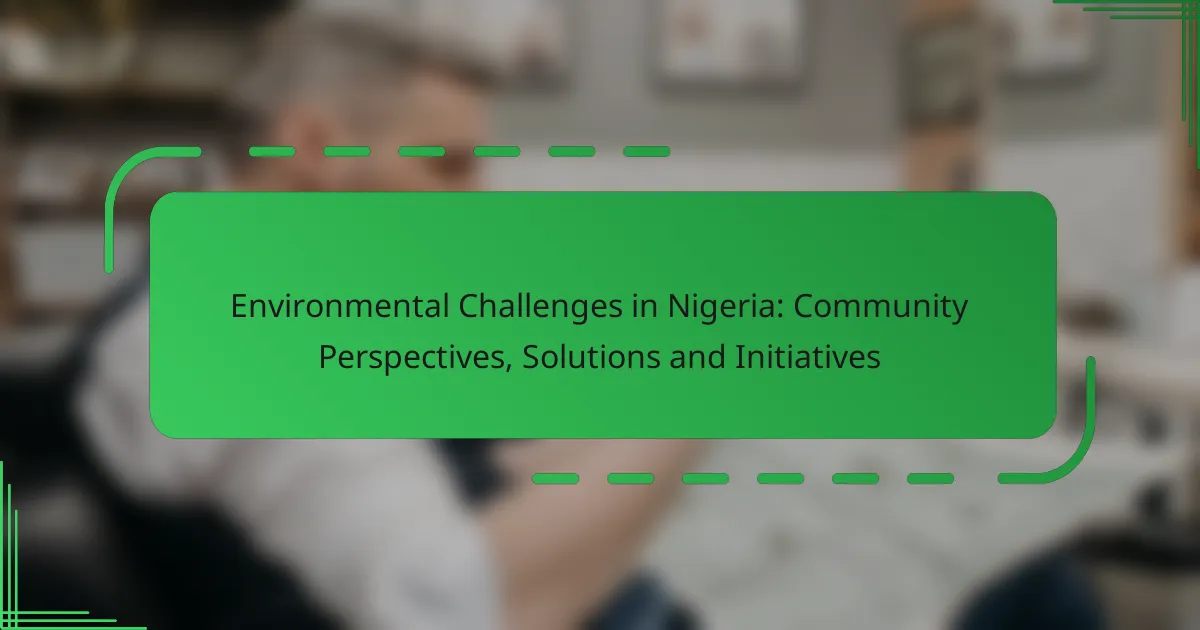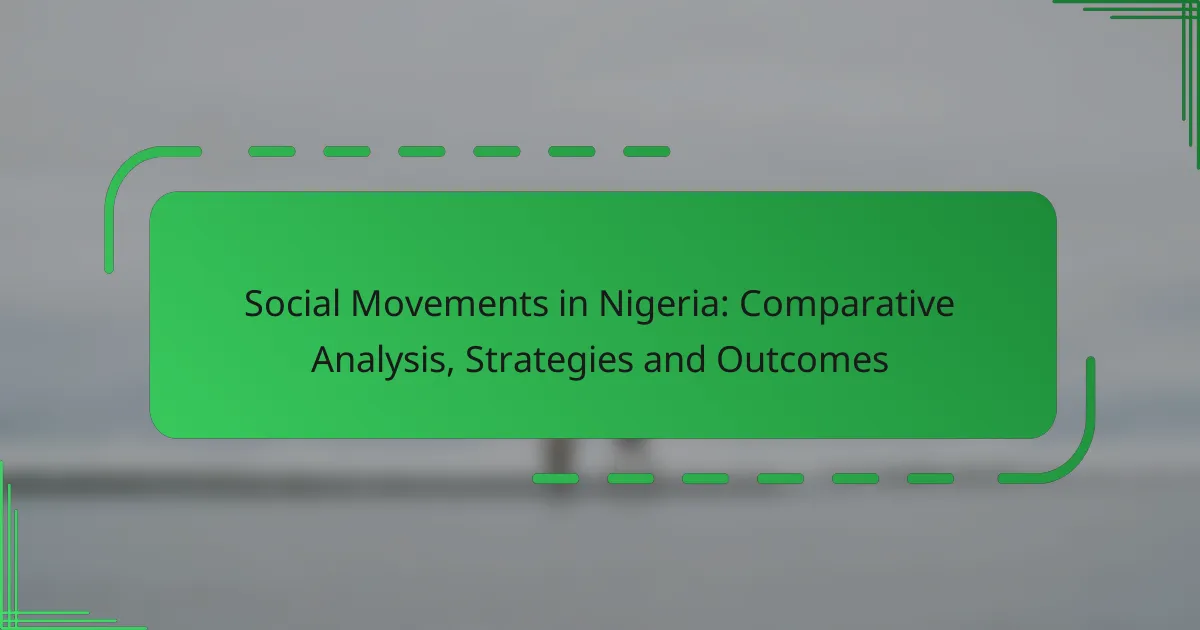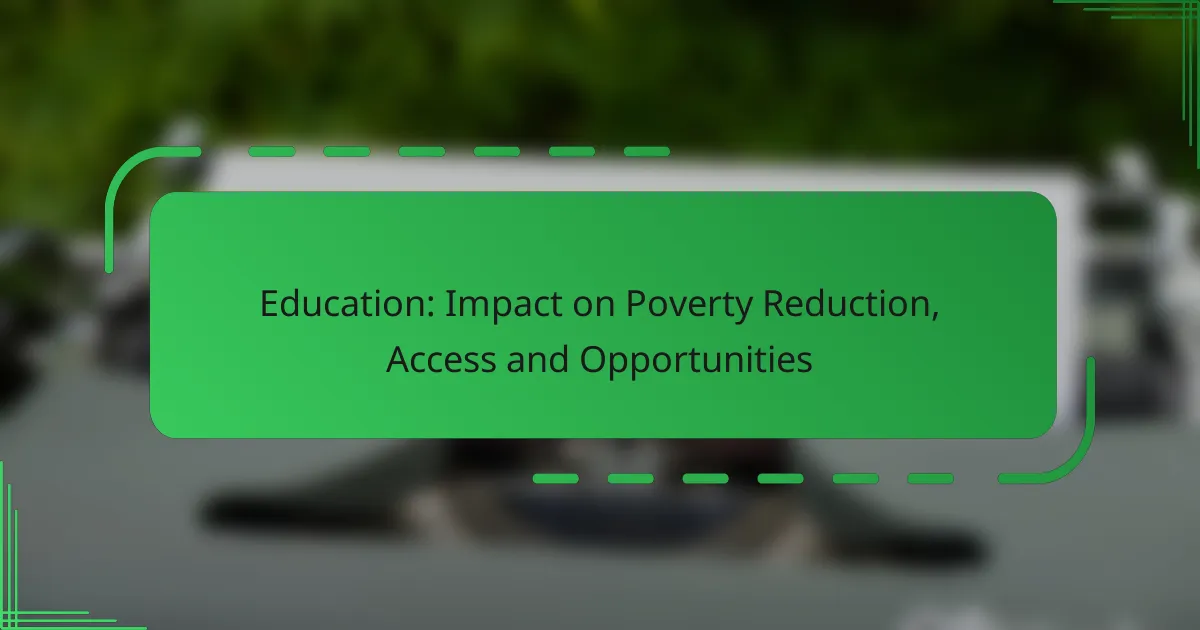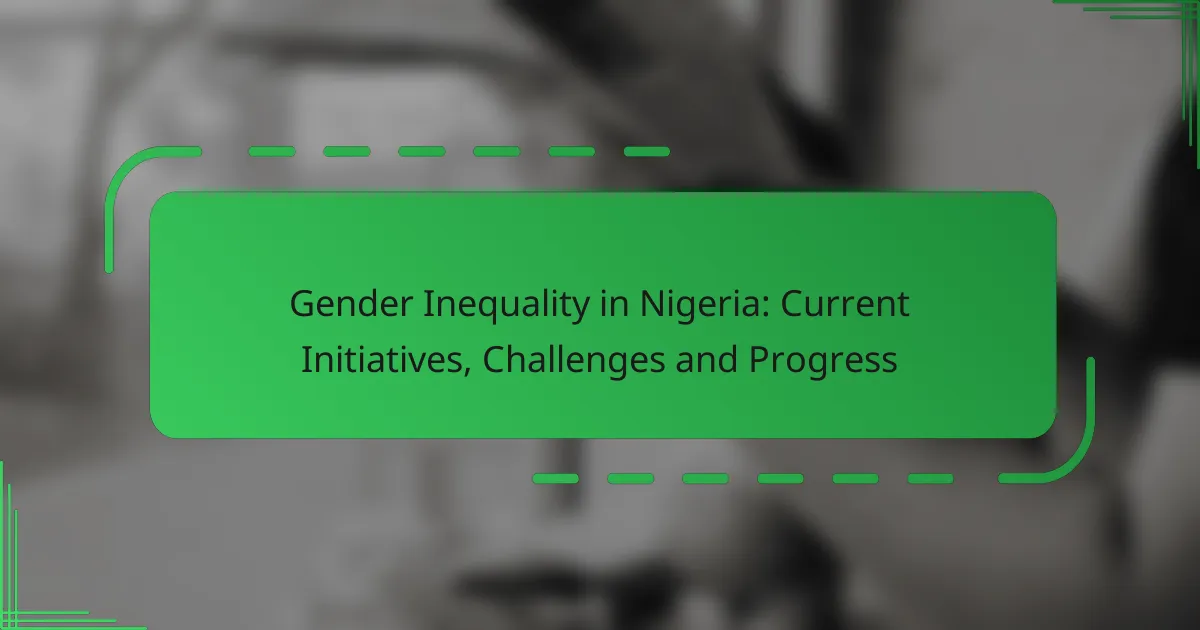Nigeria is grappling with serious environmental challenges such as deforestation, water pollution, and the impacts of climate change, which significantly affect local communities and ecosystems. In response, grassroots initiatives and NGOs are working tirelessly to promote sustainable practices, enhance local ecosystems, and improve public health through community engagement and advocacy. These efforts are crucial for fostering environmental justice and protecting Nigeria’s natural resources.
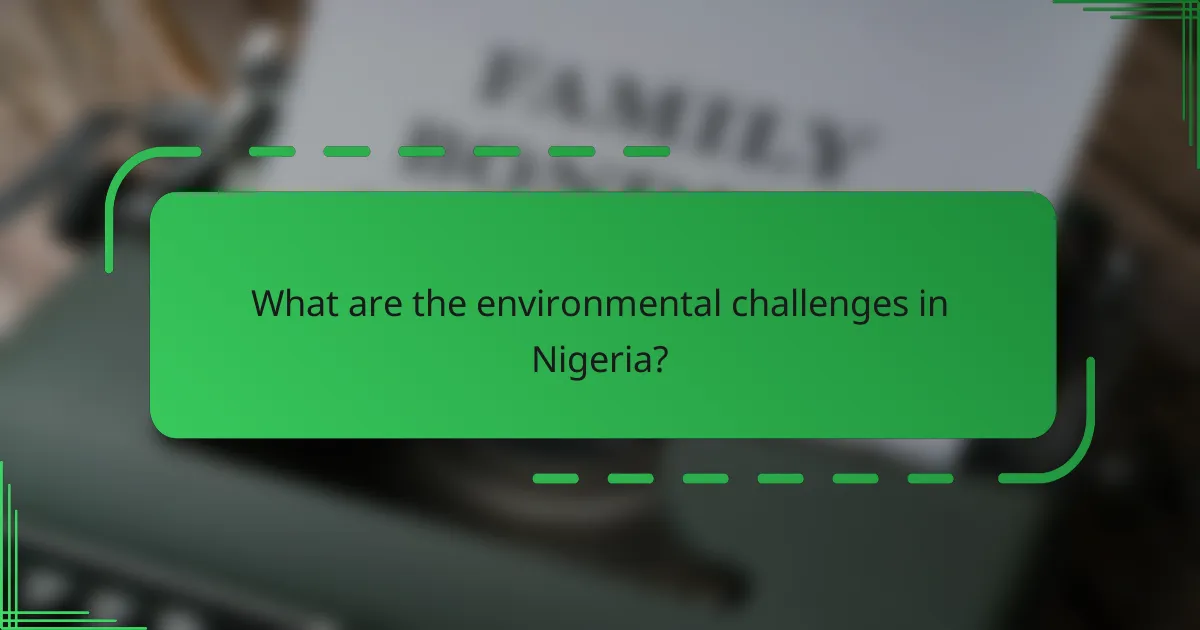
What are the environmental challenges in Nigeria?
Nigeria faces significant environmental challenges, including deforestation, water pollution, climate change effects, and waste management issues. These problems impact communities, ecosystems, and the economy, necessitating urgent attention and action.
Deforestation impacts
Deforestation in Nigeria results from agricultural expansion, logging, and urbanization. This loss of forest cover leads to habitat destruction, loss of biodiversity, and increased carbon emissions, contributing to climate change.
Communities dependent on forests for resources, such as fuelwood and medicinal plants, face economic hardships. Sustainable forestry practices and reforestation initiatives are essential to mitigate these impacts and restore ecological balance.
Water pollution sources
Water pollution in Nigeria primarily stems from industrial discharges, agricultural runoff, and inadequate waste disposal. Contaminants such as heavy metals and pesticides compromise water quality, posing health risks to local populations.
Efforts to address water pollution include stricter regulations on industrial waste and promoting community awareness about proper waste disposal. Implementing water treatment solutions can also improve access to clean water for affected communities.
Climate change effects
Nigeria experiences various climate change effects, including increased temperatures, erratic rainfall patterns, and rising sea levels. These changes threaten agriculture, food security, and water resources, impacting livelihoods across the nation.
Adaptation strategies, such as climate-resilient agriculture and improved water management, are crucial for communities to cope with these challenges. Government and NGO initiatives can support these efforts through funding and education.
Waste management issues
Waste management in Nigeria is hindered by inadequate infrastructure and public awareness. Urban areas struggle with overflowing landfills and illegal dumping, leading to environmental degradation and health hazards.
Improving waste management requires investment in recycling programs and public education campaigns. Communities can adopt practices like waste segregation and composting to reduce landfill reliance and promote sustainability.
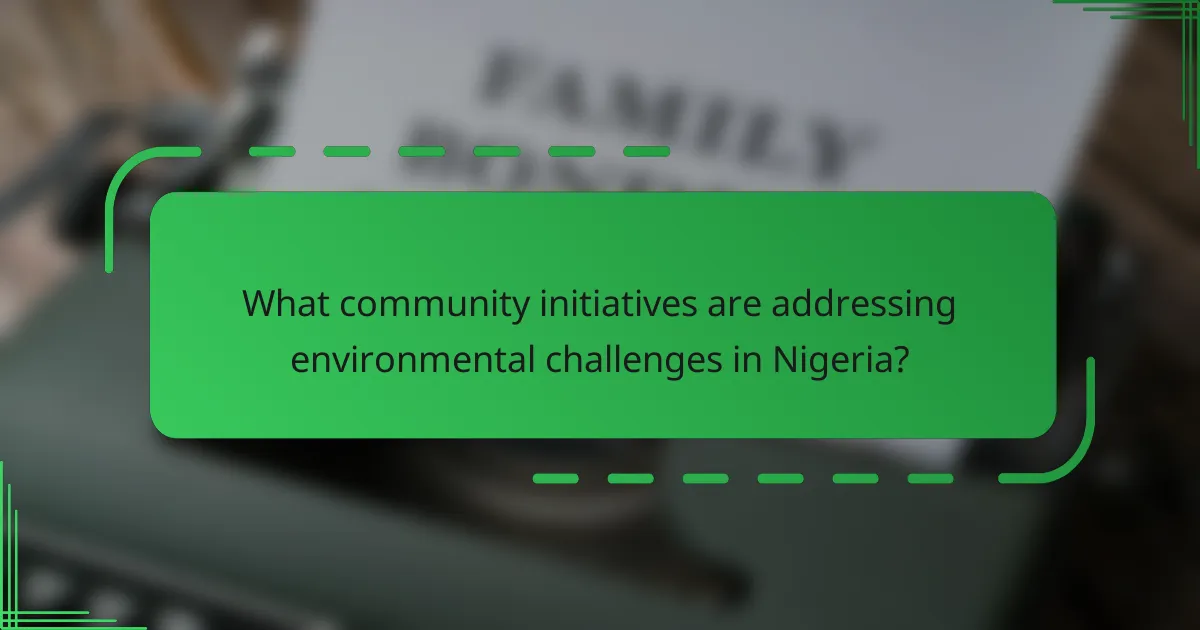
What community initiatives are addressing environmental challenges in Nigeria?
Community initiatives in Nigeria are actively tackling environmental challenges through grassroots efforts that engage local populations. These initiatives focus on sustainable practices, enhancing local ecosystems, and improving public health.
Community-led reforestation projects
Community-led reforestation projects aim to restore degraded lands and increase tree cover in Nigeria. These initiatives often involve local volunteers who plant native tree species, which help combat deforestation and enhance biodiversity.
Successful projects typically engage schools and local organizations, providing education on the importance of trees. For example, communities in the Niger Delta have initiated tree planting days, where families come together to plant saplings, fostering a sense of ownership and responsibility towards the environment.
Local clean-up campaigns
Local clean-up campaigns are organized efforts where community members gather to remove waste from public spaces, rivers, and streets. These campaigns not only improve the aesthetic quality of neighborhoods but also reduce pollution and health risks associated with waste accumulation.
In cities like Lagos, community groups often collaborate with local governments to schedule regular clean-up days. Participants are encouraged to bring their own tools and bags, and some campaigns provide incentives, such as refreshments or small prizes, to boost participation.
Water purification efforts
Water purification efforts in Nigeria focus on providing access to clean drinking water, which is crucial for public health. Community initiatives often involve the installation of simple filtration systems or the promotion of rainwater harvesting techniques to ensure safe water supply.
For instance, some rural communities have adopted solar-powered water purification systems, which are cost-effective and environmentally friendly. Training sessions on maintaining these systems are essential to ensure their longevity and effectiveness, empowering locals to take charge of their water resources.
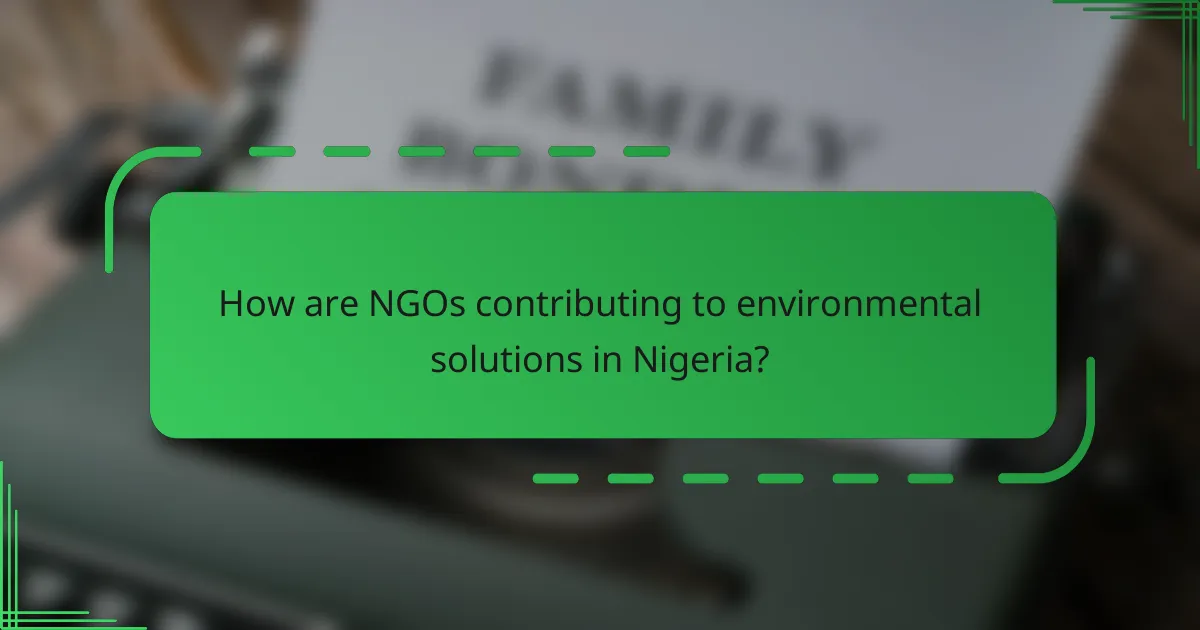
How are NGOs contributing to environmental solutions in Nigeria?
NGOs play a vital role in addressing environmental challenges in Nigeria by advocating for sustainable practices, raising awareness, and implementing community-based initiatives. Their efforts focus on promoting environmental justice, protecting natural resources, and engaging local populations in conservation activities.
Greenpeace Nigeria’s advocacy
Greenpeace Nigeria focuses on raising awareness about climate change and environmental degradation through campaigns and public engagement. They work to influence policy by lobbying for stronger environmental regulations and promoting renewable energy solutions.
One of their key initiatives includes mobilizing communities to resist harmful industrial practices, such as oil drilling and deforestation. By empowering local voices, Greenpeace aims to foster a culture of environmental stewardship among Nigerians.
Friends of the Earth Nigeria initiatives
Friends of the Earth Nigeria implements various grassroots initiatives aimed at promoting sustainable agriculture and protecting biodiversity. Their programs often include training farmers in eco-friendly practices and advocating for land rights to ensure community access to natural resources.
Additionally, they organize community clean-up events and tree-planting campaigns to enhance local ecosystems. These initiatives not only improve environmental conditions but also strengthen community bonds and raise awareness about the importance of conservation.
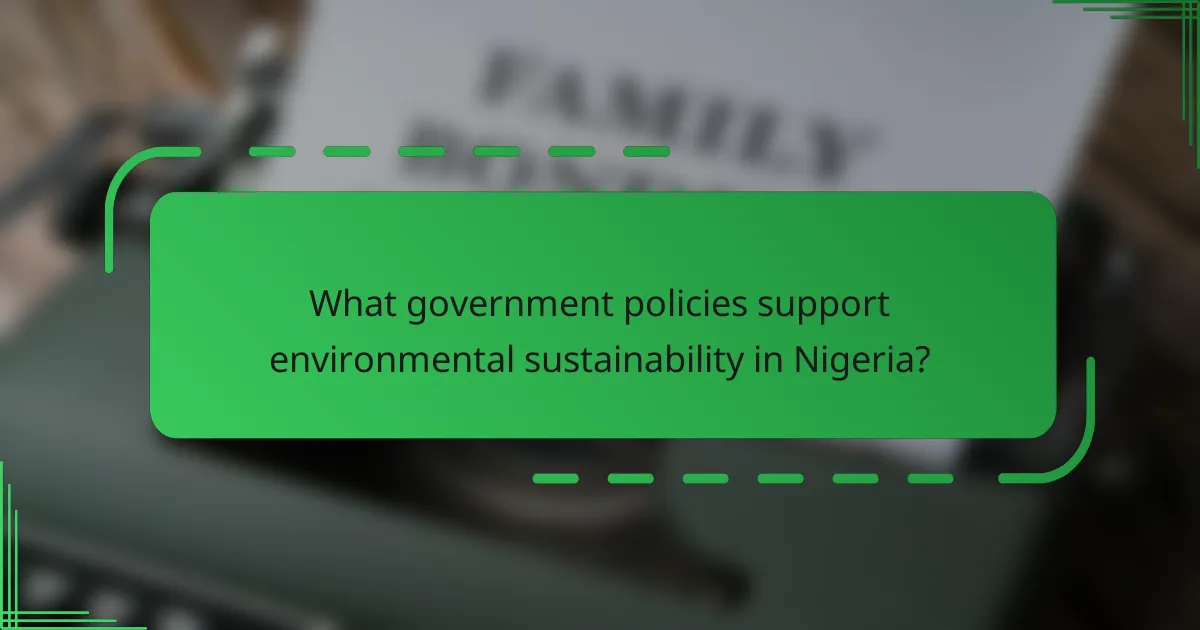
What government policies support environmental sustainability in Nigeria?
The Nigerian government implements various policies aimed at promoting environmental sustainability, focusing on conservation, climate change mitigation, and sustainable resource management. These policies are designed to address the unique environmental challenges faced by the country, including deforestation, pollution, and biodiversity loss.
National Environmental Policy
The National Environmental Policy serves as a framework for sustainable environmental management in Nigeria. It aims to integrate environmental considerations into national development planning and decision-making processes. This policy emphasizes the need for public awareness and participation in environmental governance.
Key components of the National Environmental Policy include the promotion of sustainable land use, the protection of biodiversity, and the management of natural resources. It encourages collaboration among government agencies, local communities, and non-governmental organizations to achieve these goals.
Climate Change Action Plan
The Climate Change Action Plan outlines Nigeria’s strategy to combat climate change and its impacts. This plan focuses on reducing greenhouse gas emissions while enhancing the country’s resilience to climate-related challenges. It highlights the importance of transitioning to renewable energy sources and improving energy efficiency.
Specific actions under this plan include afforestation programs, investment in clean technologies, and the development of climate-resilient infrastructure. The government also seeks to engage local communities in climate adaptation initiatives, ensuring that solutions are tailored to the needs of vulnerable populations.
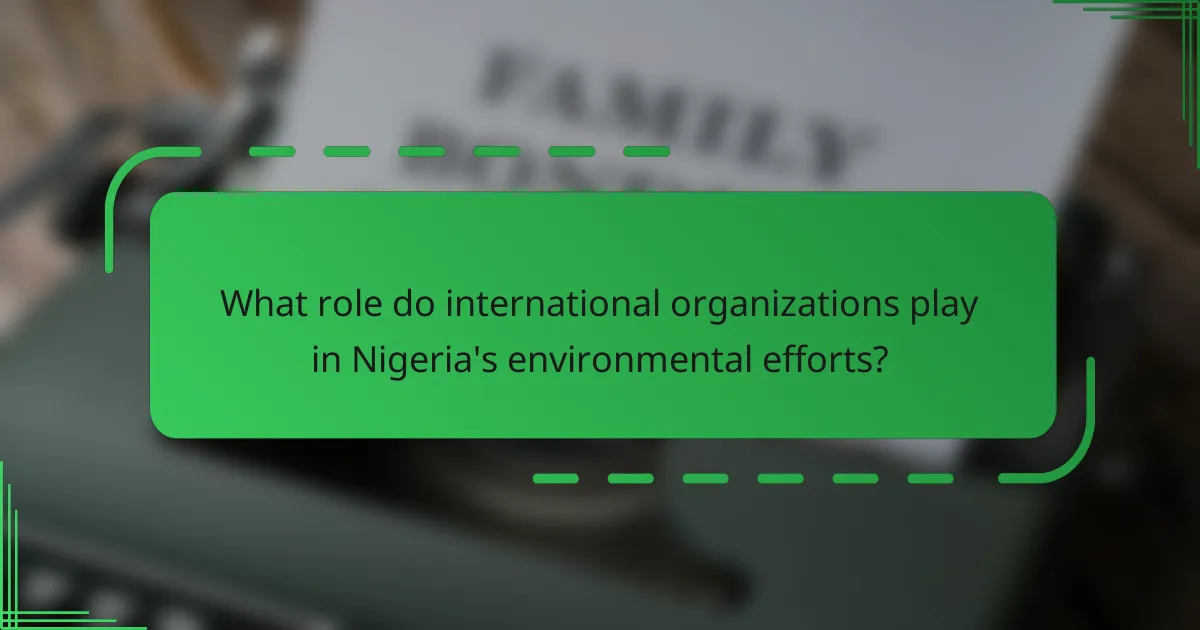
What role do international organizations play in Nigeria’s environmental efforts?
International organizations play a crucial role in Nigeria’s environmental efforts by providing funding, expertise, and support for sustainable development initiatives. They collaborate with local communities and governments to address pressing environmental challenges such as deforestation, pollution, and climate change.
UNDP projects in Nigeria
The United Nations Development Programme (UNDP) implements various projects in Nigeria aimed at promoting environmental sustainability. These initiatives focus on enhancing community resilience to climate change, improving waste management, and restoring degraded ecosystems.
For example, the UNDP has supported reforestation projects in the Niger Delta, helping to restore biodiversity and improve local livelihoods. Additionally, they provide training and resources for communities to adopt sustainable agricultural practices.
World Bank funding for sustainability
The World Bank provides significant funding for sustainability projects in Nigeria, targeting areas such as renewable energy, water resource management, and urban development. This financial support helps to implement large-scale initiatives that can lead to long-term environmental benefits.
One notable project includes investments in solar energy systems to increase access to clean energy in rural areas. The World Bank also emphasizes the importance of integrating environmental considerations into economic planning and development strategies.
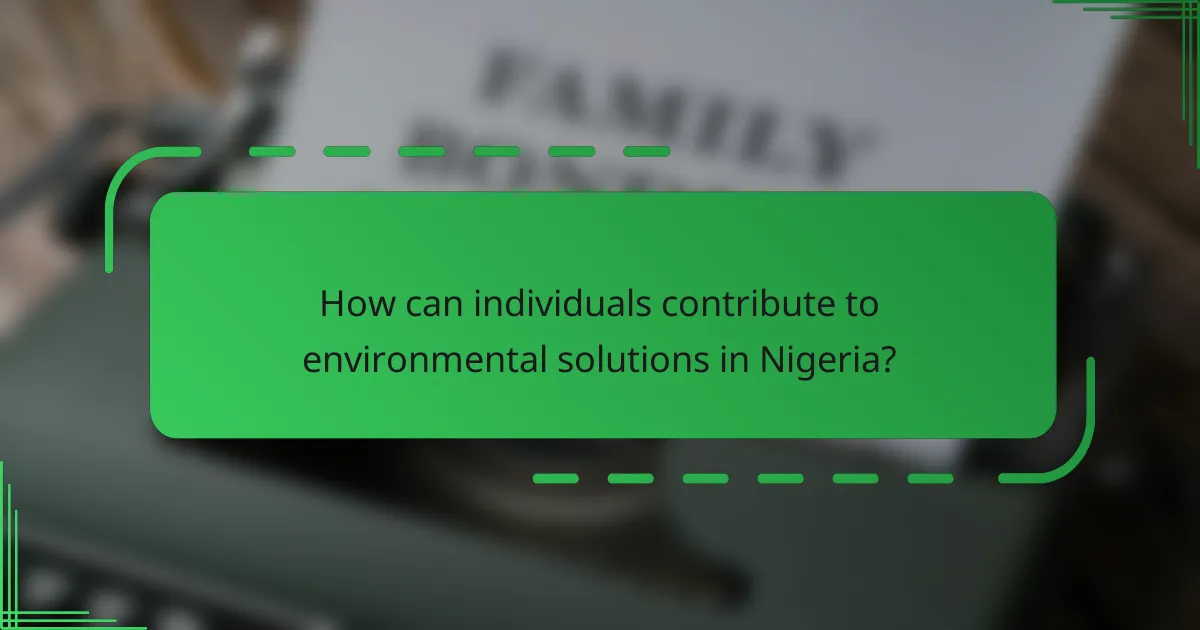
How can individuals contribute to environmental solutions in Nigeria?
Individuals in Nigeria can significantly contribute to environmental solutions through sustainable practices, community engagement, and advocacy for policy changes. Simple actions, such as reducing waste and participating in local initiatives, can collectively lead to substantial improvements in environmental health.
Adopting Sustainable Practices
Individuals can adopt sustainable practices by reducing waste, conserving water, and using energy-efficient appliances. For example, minimizing plastic use by opting for reusable bags and containers helps decrease pollution. Additionally, conserving water through simple measures like fixing leaks and using water-saving fixtures can have a meaningful impact.
Composting organic waste is another effective way to reduce landfill contributions. This practice not only decreases waste but also enriches soil, promoting healthier gardens and farms. Engaging in local recycling programs can further enhance these efforts.
Participating in Community Initiatives
Joining community initiatives, such as tree planting drives and clean-up campaigns, allows individuals to directly contribute to environmental restoration. Many local organizations in Nigeria organize events that focus on cleaning rivers and public spaces, which can foster a sense of community and shared responsibility.
Volunteering for environmental NGOs can also amplify individual efforts. These organizations often provide training and resources for sustainable practices, making it easier for individuals to implement changes in their daily lives.
Advocating for Policy Changes
Individuals can advocate for environmental policy changes by engaging with local government representatives and participating in public forums. Raising awareness about environmental issues, such as deforestation and pollution, can influence decision-makers to prioritize sustainable development.
Supporting policies that promote renewable energy and sustainable agriculture can lead to long-term environmental benefits. Individuals can also leverage social media to spread awareness and mobilize others in their communities to take action.
